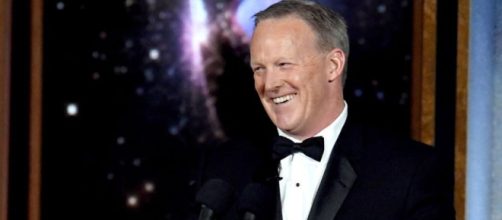At the 69th Emmy Awards ceremony this week, President Donald Trump's ex-press secretary Sean Spicer made a surprise on-stage appearance. He not only astounded the attendees (i.e., Melissa Mccarthy and Anna Chlumsky) but also viewers around the world. But the question is, what does his appearance mean for the Trump administration and international politics? Does the fact that his 'bit' parodied his exaggerated defense of Trump's inauguration crowd size impact how the world will look at future statements from the White House?
Should we have laughed?
Criticism surrounded Sean Spicer's comments during his term as the White House Press Secretary, and his Emmys cameo was no different. As a recent spokesperson for Trump's alternative facts, his conversion to the 'other side' seems to signify his loss of trust and faith in the President. A rather alarming statement, given that his previous role was to blindside American democracy.
While it's true (and sad) that we all take President Trump's statements with a pinch of salt these days, it is another thing entirely for the international community to mistrust these statements. After all, if the Press Secretary can essentially admit to lying to the press, what else has he lied about?
In a few months, will Spicer be on Saturday Night Live mocking his assertion that in Nazi Germany, it's "Holocaust centers" (which were actually gas chambers) were less evil than the chemical weapons used in Syria?
How bad are these leaks?
Perhaps more importantly, what does this mean about the leaks in the Trump administration? The fact that Spicer has so quickly turned on Trump is something that the United States and its allies need to consider. While this is obviously not tantamount to treason, the high turnover of White House employees and staffers, together with the numerous security leaks (some by the President) and informants, could be a sign of trouble for American safety. It is at least, something to think about, considering that the United States is not exactly endearing itself internationally (here's looking at Angela Merkel).
Taking the mickey out of the widespread dissemination of alternative facts is essentially saying that spokespeople need not bother themselves with credibility. But politics is not a magician's smoke and mirror's trick. It is an important part of the complexity that is international politics. If other leaders begin to lose respect for the United States because the President and his staffers treat their positions as a joke, where then do Americans stand in the greater scheme of things? The United States has long been a leader in many international arenas, but if the false news is to be believed, this may no longer be the case.
Also, is it really false news, if the rebuttal is even less rooted in truth?


